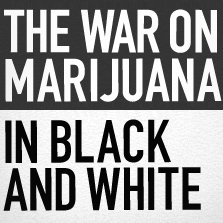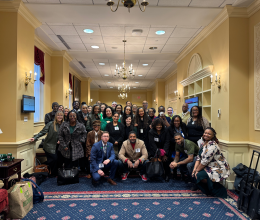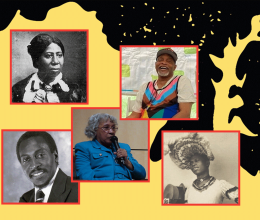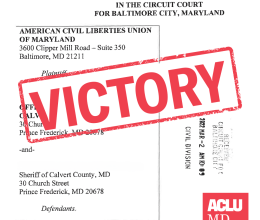
- Download the report, "The War on Marijuana in Black and White"
- Download the Maryland information page from the "War on Marijuana in Black and White" report
- Learn more about ACLU of Maryland's work to reduce over-incarceration
CONTACT: Meredith Curtis, media@aclu-md.org, 410-889-8555
BALTIMORE - According to a new report by the ACLU, African Americans were nearly three times as likely as whites to be arrested for simple marijuana possession in 2010, even though research consistently shows comparable rates of use across race. The report, Marijuana in Black and White: Billions of Dollars Wasted on Racially Biased Arrests, released today, is the first ever to examine state and county marijuana arrest rates nationally by race. The findings show that while there were pronounced racial disparities in marijuana arrests ten years ago, they have grown significantly worse. In addition, the report finds that the number of people arrested for marijuana possession increased substantially between 2001 and 2010 - and that African-Americans disproportionately bore the brunt of this increase in policing of marijuana.
A detailed county-by-county analysis of arrest data in Maryland will be released in the coming weeks by the ACLU of Maryland.
"The war on marijuana has disproportionately been a war on people of color," said Ezekiel Edwards, Director of the Criminal Law Reform Project at the ACLU and one of the primary authors of the report. "State and local governments have aggressively enforced marijuana laws selectively against Black people and communities, needlessly ensnaring hundreds of thousands of people in the criminal justice system at tremendous human and financial cost."
According to the report, Maryland has one of the highest arrest rates for marijuana possession in the country - it is fourth in the nation. In Maryland, police arrest one out of every 250 people for marijuana possession. Alarmingly, arrests for marijuana possession increased by 34% to a whopping 23,663 arrests in 2010. Maryland is now seventh highest in the country in terms of the raw number of marijuana possession arrests - outranking far more populous states like Pennsylvania and Ohio, which have more than twice the population of Maryland. In Maryland, marijuana possession arrests now make up 90% of all marijuana-related arrests and 50% of all drug arrests.
But even more alarming is that in Maryland, African-Americans comprise only 30% of the state's population - but 58% of arrests for marijuana possession. As is true nationally, the data shows that the race disparities in arrests have worsened - between 2001 and 2010. In 2001, blacks were twice as likely as whites to be arrested for marijuana possession. By 2010, African-Americans were three times as likely as their white counterparts to be arrested for marijuana possession in Maryland; whites were arrested at a rate of less than three per 1,000, while blacks were arrested at a rate of roughly eight per 1,000.
Put another way - between 2001 and 2010, Maryland's black population increased by 13%, but black arrests for marijuana possession increased by 69%. During that same period, Maryland's white population experienced a 4% increase in marijuana possession arrests.
Despite the fact that a majority of Americans now support marijuana legalization, nationally, states spent an estimated $3.61 billion enforcing marijuana possession laws in 2010 alone. Here in Maryland, we spent $106 million enforcing marijuana laws in 2010 - placing us 9th in the nation. That is why the ACLU supported and advocated for legislation, SB 297, which would have decriminalized possession of small amounts of marijuana. While the bill made historic progress by passing the State Senate, the bill stalled in the House Judiciary Committee.
"Marijuana decriminalization efforts in the Maryland General Assembly advanced further than ever before this past session," said Sara Love, Public Policy Director of the ACLU of Maryland. "With this momentum and the new report, the ACLU of Maryland will continue advocating for reform of Maryland's racially biased and aggressive penalization of marijuana possession, which has torn communities apart, not improved public safety, not eradicated use, and has been a colossal waste of money."
Arrests for possession of even the smallest amounts of marijuana have often resulted in losing student financial aid, deportations, losing custody of children, greater difficulty finding a job, or ineligibility for public housing. Just as importantly, for every person who is found with marijuana, many more who have done nothing wrong are subjected to humiliating stops and searches by police - disproportionately people of color. The selective enforcement of marijuana possession laws has caused entire communities of people to be subjected to additional scrutiny by police not because they have done anything wrong - again, marijuana use rates are comparable -- but rather because of the color of their skin under the guise of the war on drugs and marijuana in particular.
Love added: "Now is the time to end this racially disparate approach of arresting and jailing people in Maryland for possession of marijuana because it not only wastes limited resources, but it hurts communities, and erodes trust with law enforcement."
Key national findings from the report include:
Arrests Rates
- Nationwide, between 2001 and 2010, there were 8.2 million marijuana arrests. Over 7 million, or 88%, of these arrests were for possession (versus for sale or distribution). In 2010, there were over 889,000 marijuana arrests - 300,000 more than arrests for all violent crimes combined that year. This means one marijuana arrest every 37 seconds. Over 780,000 of those arrests were for possession.
Race Disparities
- Nationwide, a Black person was over 3.7 times more likely to be arrested for marijuana possession than a white person, despite comparable usage rates.
- In the states with the worst disparities, Blacks were on average more than 6 times as likely to be arrested for marijuana possession as whites. And, in counties with the worst disparities, Blacks were over 10, 15 and even 30 times more likely to be arrested.
- The racial disparities exist in all regions of the U.S., as well as in both large and small counties, cities and rural areas, and in both high- and low-income communities. Disparities are also consistently high whether Blacks make up a small or a large percentage of a county's overall population.
Nationally, the ACLU is calling for the states to legalize marijuana by licensing and regulating marijuana production, distribution, and possession for persons 21 or older, taxing marijuana sales, and removing state law criminal and civil penalties for such activities, which it says would eliminate the unfair racially- and community-targeted selective enforcement of marijuana laws. In addition, at a time when states are facing budget shortfalls, taxing and regulating would allow them to save millions of dollars currently spent on enforcement while raising millions more in revenue, money that can be invested in public schools and community and public health programs, including drug treatment.
In the report, the organization also urges lawmakers and law enforcement to reform policing practices, including ending racial profiling as well as unconstitutional stops, frisks, and searches, and also to reform state and federal funding streams that incentivize police to make low-level drug arrests.
###







